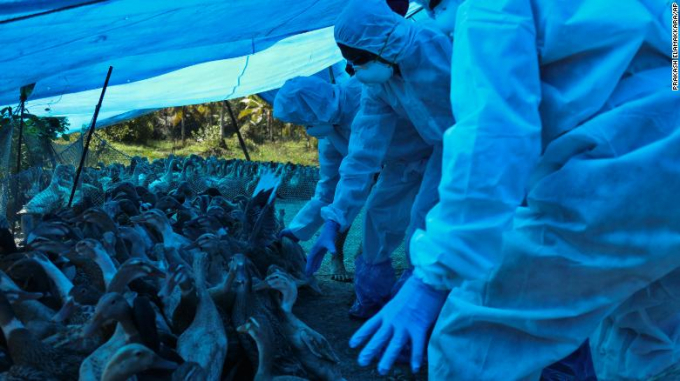December 19, 2025 | 09:51 GMT +7
December 19, 2025 | 09:51 GMT +7
Hotline: 0913.378.918
December 19, 2025 | 09:51 GMT +7
Hotline: 0913.378.918

Health workers begin culling ducks after avian flu was detected among domestic birds in Alappuzha district, Kerala state, India, on January 5, 2021. Photo: CNN.
Russian authorities say they have detected what is believed to be "human infection with avian influenza H5N8," the World Health Organization (WHO) has confirmed to CNN.
Russia notified WHO of the possible strain. "If confirmed, this would be the first time H5N8 has infected people," a WHO Europe spokesperson said in a statement Saturday.
The reported cases were workers exposed to bird flocks, according to preliminary information, the statement added.
The workers were "asymptomatic and no onward human to human transmission was reported," the spokesperson said.
Speaking during a televised briefing on Saturday, Anna Popova, the head of Russia's Federal Service for Surveillance on Consumer Rights Protection and Human Wellbeing, said that the strain had been detected in seven poultry farm workers in the south of the country, state-run news agency TASS reported.
While still not confirmed by the WHO, the Russian health authority has said it is in discussion with national authorities to gather more information and "assess the public health impact" of the incident.
Avian flu usually affects only birds and there are many different strains of it.
Most cases of human infection are due to contact with infected poultry or surfaces that are contaminated with infected bird excretions: saliva, nasal secretions or feces.
In 2014 an H5N8 outbreak infected poultry on farms in Germany, the Netherlands and the United Kingdom.
(CNN)

(VAN) The global population is expected to grow in the coming years. This means higher demand for animal protein, and therefore, challenges and opportunities for the animal nutrition industry.

(VAN) $58.8 million from Global Environmental Facility targets efforts in Bangladesh, DR Congo, India, Mexico, Senegal, Tanzania and Ukraine.

(VAN) Chinese industry groups are urging a suspension of phosphate fertilizer exports, a move that may tighten global supply and push up prices just as U.S. farmers prepare for spring planting.

(VAN) OMB Director Russell Vought said the National Science Foundation "will be breaking up" the National Center for Atmospheric Research in Colorado.

(VAN) Budget-friendly drive-through and convenience store coffee locations are seeing strong, sometimes double-digit, growth in visits.

(VAN) 2025 AQUASTAT Water Data indicates that pressure on freshwater resources is growing as demand increases in regions of scarcity.

(VAN) Planet-warming pollution rates exploded after the end of World War II. James Watt’s steam engine launched the Industrial Revolution in 1769.